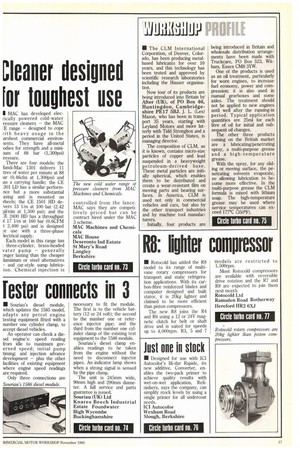7.d ifflJith
Page 101

If you've noticed an error in this article please click here to report it so we can fix it.
• The CLM International Corporation, of Denver, Colorado, has been producing metalbased lubricants for over 10 years, and this technology has been tested and approved by scientific research laboratories including the Hauser organisation.
Now tour of its products are being introduced into Britain by' After (UK), of PO Box 46, Huntingdon, Cambridgeshire PE17 5B,J. J. L (Les) Mason, who has been in transport 35 years, starting with Leyland Motors and more latterly with Tidd Strongbox and a period in the United States, is managing director.
The composition of CLM, as it is known, contains micro-size particles of copper and lead suspended in a heavyweight petroleum-derived base. These metal particles are initially spherical, which enables them to be distributed and create a wear-resistant film on moving parts and bearing surfaces. In America, CLM is used not only in commercial vehicles and cars, but also by the other transport industries and by machine tool manufacturers.
Initially, four products are being intro:ince:I in bntain aria wholesale distribution arrangements have been made with Truckcare, PO Box 523, Witham, Essex CM8 One of the products is used as an oil treatment, particularly for worn engines, to increase fuel economy, power and compression; it is also used in manual gearboxes and some axles. The treatment should not be applied to new engines until well after the running-in period. Typical application quantities are 25m1 for each litre of oil for initial and subsequent oil changes. .
The other three products coming on the British market are a lubricating/penetrating spray, a multi-purpose grease and a high-temperature grease.
With the spray, for any sliding or moving surface, the penetrating solvents evaporate, so allowing lubrication to become more effective. In the multi-purpose grease the CLM formula is mixed with lithium soap. The high-temperature grease may be used where service temperatures can exceed 177°C (350°F).
























































































































